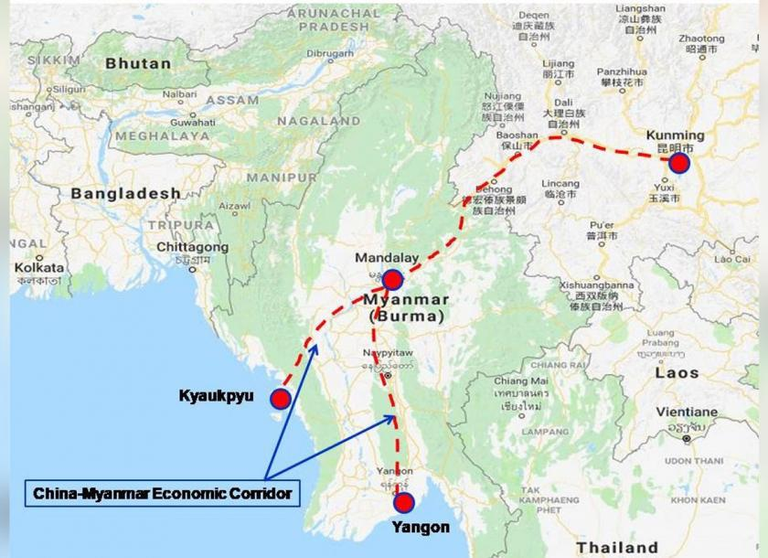
Since the military took power in Myanmar back in 2021, China has emerged as one of its few state allies, providing the military regime with a key lifeline while it faces increasing pressure from Western imposed sanctions. But the ongoing civil war that followed the coup is a growing challenge for China, which has significant economic and security interests in Myanmar. So in this article, I am going to explain the problems that Myanmar poses for China and why China might be losing patience with the military regime.
Now, first things first, I am going to do our best to avoid repeating ourselves on this topic. So if you want to know more about the background on Myanmar's civil war and what's been going on there over the last couple of years, then you should check out my recent article where we dove into exactly that. Essentially, though, Myanmar's been going through a civil conflict since the country's military overthrew the elected government of Aung San Suu Kyi back in February 2021, as well as fighting against the armed wing of the opposition national unity government called the People's Defense Force, the Burmese military has also been fighting against various ethnic armed organizations. These are effectively armed rebel groups from specific ethnic communities, fighting in many cases for decades for greater autonomy. Now, three ethnic armed organizations came together a few years ago to form what they called the Three Brotherhood Alliance. Those three groups being the Arakan Army, the Myanmar National Democratic Alliance Army, and the Ta'ang National Liberation Army.

Since the coup 2021, the three Brotherhood Alliance has repeatedly clashed with the military, largely over their own territorial disputes and not explicitly in support of the national unity government. However, last month, on October 27th, the Brotherhood Alliance launched operation 1027, a coordinated anti-regime offensive that within two weeks saw the alliance reportedly overrun and seize control of at least 130 strategic military positions and installations. They also captured villages and towns, though most notably a key trading point right on the border with China. In a statement, the Brotherhood Alliance declared its goal of overthrowing the military regime and the national unity government applauded their operation. Now, the first most obvious problem that this poses for China is security. No country wants a neighboring state at war, especially if the active conflict zone reaches right up to the border. Amidst this recent fighting between the Brotherhood Alliance and the Burmese army, there have reportedly been a number of Chinese casualties within Myanmar, and at least one shell has inadvertently landed on the Chinese side of the border, damaging some houses.
With this in mind, China has urged for a ceasefire in northern Myanmar and called for all parties to pay particular attention to China's security concerns and work with China to maintain the safety of the China-myanmar cooperation projects. What China is referring to here are the important economic and trade links between the two countries, which are worth exploring in a little more detail. That's because Shan State in northern Myanmar is a key transport artillery for billions of dollars worth of cross border trade. There are also important existing and planned infrastructure projects linking the two countries in what's known as the China Myanmar Economic Corridor, part of China's Global Belt and Road Initiative. For example, China imports oil and gas through pipelines which traverse Myanmar, through Shan State and across the border into China's Yunnan province. And one of the headline planned projects of the economic corridor is a China Myanmar Railway, which would stretch from the border town of muse all the way down to the coast. This is of particular interest to China, as it would create a route to the Indian Ocean, allowing Chinese imports and exports to avoid the Strait of Malacca, a hugely important maritime chokehold that China is keen to reduce its dependence on.

With all of this on the line, then in attempts to stabilize the parts of Myanmar near the Chinese border earlier this year, China had sponsored talks between the military junta and the Brotherhood Alliance, although these collapsed and evidently failed given the alliance's operation 1027 was launched just months later. But this is where things get even more interesting, as there are signals that China might be starting to sour on Myanmar's military regime. To understand this, we need to talk more about Shan State on the border with China, which has become home to a phenomenon that is plaguing not just China, but people all around the world: Online scams. In the last few years, there's been a proliferation of online scams and fraud being orchestrated out of compounds based across Southeast Asia, particularly in Myanmar, just across the border with China. This multi-billion dollar illicit business is operated out of compounds generally run by Chinese organized crime syndicates. The compounds are full of people who'd been trafficked from abroad, including from China, who are treated poorly and who are effectively carrying out forced labour in the forms of romance or crypto scams, investment fraud, illegal gambling and more.
A recent UN report, while acknowledging the difficulty in estimating the scale, suggests that there could be more than 120,000 people across Myanmar who may be held in situations where they're being forced to carry out online scams. And the existence of these kinds of operation are far from secret in fact for the Chinese public, there are pretty well known problem. For example, no more bets, A Chinese crime thriller about people trafficked to one of these fraud factories dominated the Chinese box office when it came out in August this year. Now, China's concerns about these operations are twofold. Firstly, there are Chinese victims of human trafficking that are being forced to carry out these scams and then there are many more victims across the world, including in China, who are being defrauded by said scams. As a result, China has for a while now been pressuring the military junta and local allies to crack down on these scam compounds and the syndicates who run them, but with little success. Much to the frustration of the Chinese authorities. So it's notable that when the three Brotherhood alliance launched operation 1027, not only did they declare their goal of toppling the military dictatorship, but they also stated their commitment to tackling the widespread fraud operations plaguing the country, particularly along the China Myanmar border.

As such, some analysts have suggested that China has actually given tacit approval for the operation, a view further supported by the issuing of new arrest warrants by China for several members of a junta aligned crime family believed to be behind a network of scam operations in the Kokang Self-Administered zone in northern Shan State. This whole recent saga then has really shown that China is not exactly wedded to the military regime in Myanmar, despite the considerable support that it's already given it. Unsurprisingly, when push comes to shove, China's priority in Myanmar will be to protect its own interests, stability and security, economic cooperation and trade and law and order. If Beijing thinks that the military no longer is the best option to achieve these goals, and the anti-regime forces are more useful, then it could be disastrous for Myanmar's military regime, which is already on the back foot in the battlefield.
Source of potential text plagiarism
Plagiarism is the copying & pasting of others' work without giving credit to the original author or artist. Plagiarized posts are considered fraud. Fraud is discouraged by the community.
Guide: Why and How People Abuse and Plagiarise
If you believe this comment is in error, please contact us in #appeals in Discord.